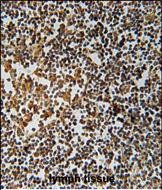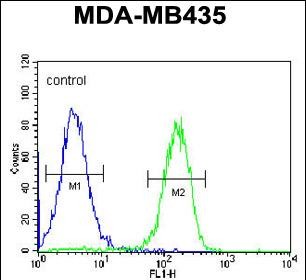PYHIN1 Antibody (N-term)
Affinity Purified Rabbit Polyclonal Antibody (Pab)
- SPECIFICATION
- CITATIONS
- PROTOCOLS
- BACKGROUND

Application
| FC, IHC-P, WB, E |
|---|---|
| Primary Accession | Q6K0P9 |
| Other Accession | Q16666, NP_945146.1, NP_945148.1 |
| Reactivity | Human |
| Host | Rabbit |
| Clonality | Polyclonal |
| Isotype | Rabbit IgG |
| Calculated MW | 55065 Da |
| Antigen Region | 26-55 aa |
| Gene ID | 149628 |
|---|---|
| Other Names | Pyrin and HIN domain-containing protein 1, Interferon-inducible protein X, PYHIN1, IFIX |
| Target/Specificity | This PYHIN1 antibody is generated from rabbits immunized with a KLH conjugated synthetic peptide between 26-55 amino acids from the N-terminal region of human PYHIN1. |
| Dilution | FC~~1:10~50 IHC-P~~1:50~100 WB~~1:1000 E~~Use at an assay dependent concentration. |
| Format | Purified polyclonal antibody supplied in PBS with 0.09% (W/V) sodium azide. This antibody is purified through a protein A column, followed by peptide affinity purification. |
| Storage | Maintain refrigerated at 2-8°C for up to 2 weeks. For long term storage store at -20°C in small aliquots to prevent freeze-thaw cycles. |
| Precautions | PYHIN1 Antibody (N-term) is for research use only and not for use in diagnostic or therapeutic procedures. |
| Name | PYHIN1 |
|---|---|
| Synonyms | IFIX |
| Function | Major mediator of the tumor suppressor activity of IFN in breast cancer cells. Promotes ubiquitination and subsequent degradation of MDM2, which leads to p53/TP53 stabilization. Promotes ubiquitination and subsequent degradation of HDAC1, which in turn enhances maspin expression, and impairs invasive activity of cancer cells. |
| Cellular Location | [Isoform 1]: Nucleus, nucleoplasm. [Isoform 5]: Nucleus. Nucleus speckle. |
| Tissue Location | Expressed in spleen, lymph node and peripheral blood leukocytes, and at lower levels in thymus, bone marrow and fetal liver. Down-regulated in breast tumors. |

Thousands of laboratories across the world have published research that depended on the performance of antibodies from Abcepta to advance their research. Check out links to articles that cite our products in major peer-reviewed journals, organized by research category.
info@abcepta.com, and receive a free "I Love Antibodies" mug.
Provided below are standard protocols that you may find useful for product applications.
Background
PYHIN1 belongs to the HIN200 family of interferon-inducible proteins that share a 200-amino acid signature motif at their C-terminal ends. HIN200 proteins are primarily nuclear and are involved in transcriptional regulation of genes important for cell cycle control, differentiation, and apoptosis (Ding et al., 2006 [PubMed 16479015]).
References
Yamaguchi, H., et al. Mol. Carcinog. 47(10):739-743(2008)
Ding, Y., et al. Mol. Cell. Biol. 26(5):1979-1996(2006)
Ding, Y., et al. Oncogene 23(26):4556-4566(2004)
If you have used an Abcepta product and would like to share how it has performed, please click on the "Submit Review" button and provide the requested information. Our staff will examine and post your review and contact you if needed.
If you have any additional inquiries please email technical services at tech@abcepta.com.













 Foundational characteristics of cancer include proliferation, angiogenesis, migration, evasion of apoptosis, and cellular immortality. Find key markers for these cellular processes and antibodies to detect them.
Foundational characteristics of cancer include proliferation, angiogenesis, migration, evasion of apoptosis, and cellular immortality. Find key markers for these cellular processes and antibodies to detect them. The SUMOplot™ Analysis Program predicts and scores sumoylation sites in your protein. SUMOylation is a post-translational modification involved in various cellular processes, such as nuclear-cytosolic transport, transcriptional regulation, apoptosis, protein stability, response to stress, and progression through the cell cycle.
The SUMOplot™ Analysis Program predicts and scores sumoylation sites in your protein. SUMOylation is a post-translational modification involved in various cellular processes, such as nuclear-cytosolic transport, transcriptional regulation, apoptosis, protein stability, response to stress, and progression through the cell cycle. The Autophagy Receptor Motif Plotter predicts and scores autophagy receptor binding sites in your protein. Identifying proteins connected to this pathway is critical to understanding the role of autophagy in physiological as well as pathological processes such as development, differentiation, neurodegenerative diseases, stress, infection, and cancer.
The Autophagy Receptor Motif Plotter predicts and scores autophagy receptor binding sites in your protein. Identifying proteins connected to this pathway is critical to understanding the role of autophagy in physiological as well as pathological processes such as development, differentiation, neurodegenerative diseases, stress, infection, and cancer.




